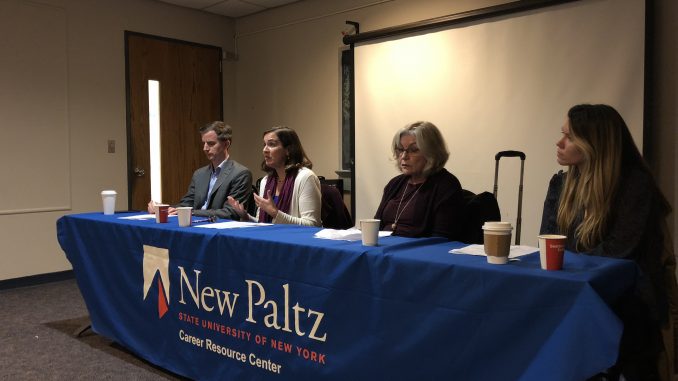
Prospective medical students gathered at the Student Union Building, to learn more about the opportunities available to them, apart from the traditional hospital route.
This discussion was held by the Career Resource Center on Wednesday, Nov. 7 from 5-6 p.m, where four panelists shared more information about their colleges’ specific programs and career benefits.
Upon arrival, students were encouraged to shift to the front of the room, where a set of arranged tables shaped their possible career routes, for a more intimate discussion in preparation for the years to come.
There were representatives from four graduate colleges, all within two hours of New Paltz: Albany College of Pharmacy and Health Sciences (Justin Hadley), Hofstra University (Stefania Chomczyk), New York Medical College of Health Sciences and Practice (Pam Suett) and University at Albany School of Public Health (Caitlin Reid).
Around 15 attendees silently absorbed their streams of advice, while a moderator delivered questions to facilitate discussion amongst them. They also listened respectfully to one another and bounced their university-specific topics off of each other.
“When I started here just over three years ago, I wanted to provide a program for students who were interested in the medical field, but maybe not the traditional medical school route,” said Samantha Lopes, senior career specialist for education and science.
Students were encouraged by the representatives to do more research and deeply evaluate their options, especially before committing to fixed programs, such as areas within public health and epidemiology, which fall on two different points of the healthcare spectrum.
“Sometimes students are forced to move into a medical career too soon by parents or other factors,” said Suett, director of recruitment at New York Medical College of Health Sciences and Practice. “[However] this is a time for you to get an understanding of the whole healthcare system and prepare you to go to medical school or not.”
Each representative stressed to students the importance of needling their ways into networking opportunities, like internships and forming relationships with organizations, before attempting to inject themselves into specific healthcare disciplines. The benefits of taking a gap year were also noted, as this provides students with time not just to consider their options, but to delve into their fascinations, discover internships and other opportunities and develop a broad-based understanding of the medical field in general. Eighty percent of medical school applicants actually take a gap year, according to Reid, assistant dean for admissions and student affairs for the University at Albany School of Public Health.
“It’s common knowledge that people don’t really get accepted into medical school straight off the bat, because you need a lot of experience,” said third-year biology major Oluwaseyi Rasaki. “[With this] you’re actually able to do something with your time, rather than just like doing research or interning.”
A couple unexpected personal experiences were even shared to emphasize that it is essential for each individual to discover which path is personally best to walk upon, before rushing into a program and finding out their initial desires have ultimately flatlined.
“I talk from personal experience—I was a speech pathology major as an undergraduate and I waited to do my internships [and] my clinical hours until the end of my junior year,” said Chomczyk, assistant dean of graduate admission at Hofstra University. “Then I got into my clinical setting and I knew in my gut this was not what I wanted to do.”
By 2020 one-third of the public healthcare workforce is set to retire, according to Reid, and in 10 years that number will increase to 50 percent. The upcoming generation of medical students will be tasked with replacing these long-lasting positions, carrying on the healthcare of this country after their studies.
“I’ve heard a lot of information that I didn’t even know,” said third-year psychology (concentration in industrial-organizational) major Irene Wu, who wants to become a pediatrician. “I haven’t even taken the bio classes, chem classes…and I didn’t think about [how] I need to fulfill these classes before I even go on to thinking even about ancillary nursing programs, so hearing that they have programs that will help you fulfill the requirements, and then lead you to the path of the medical field, I was like, ‘wow, that’s really interesting.’”

